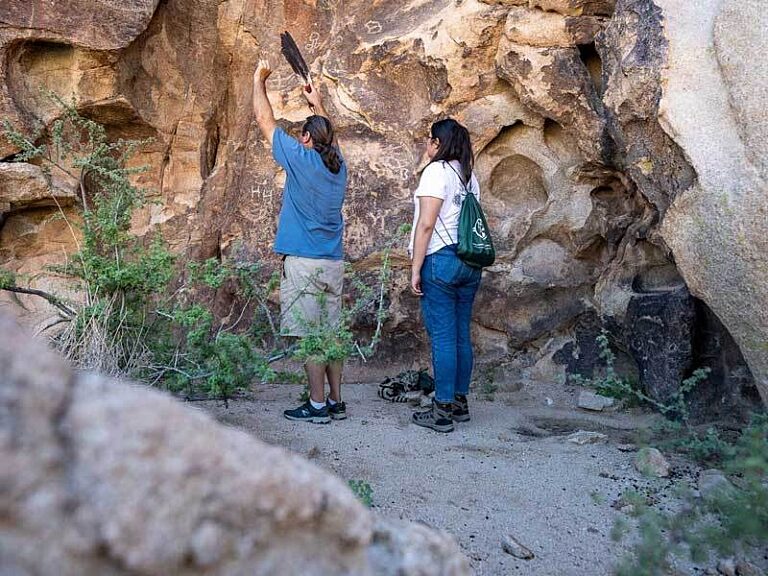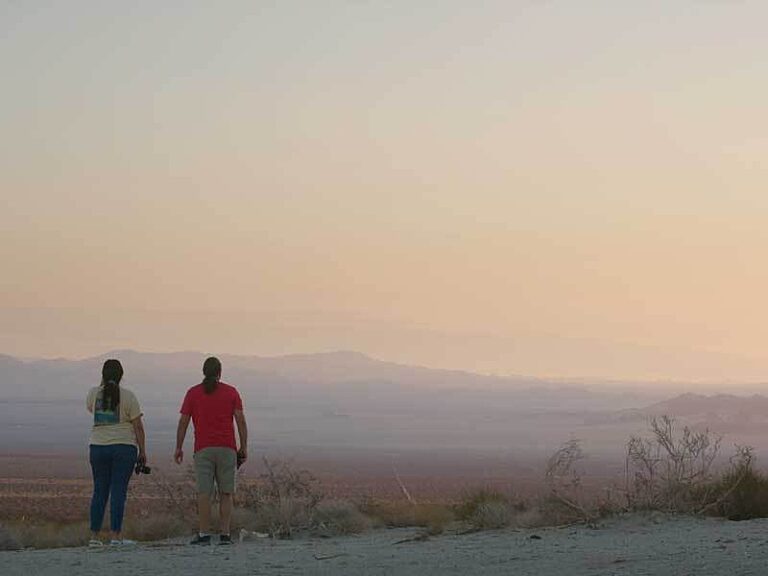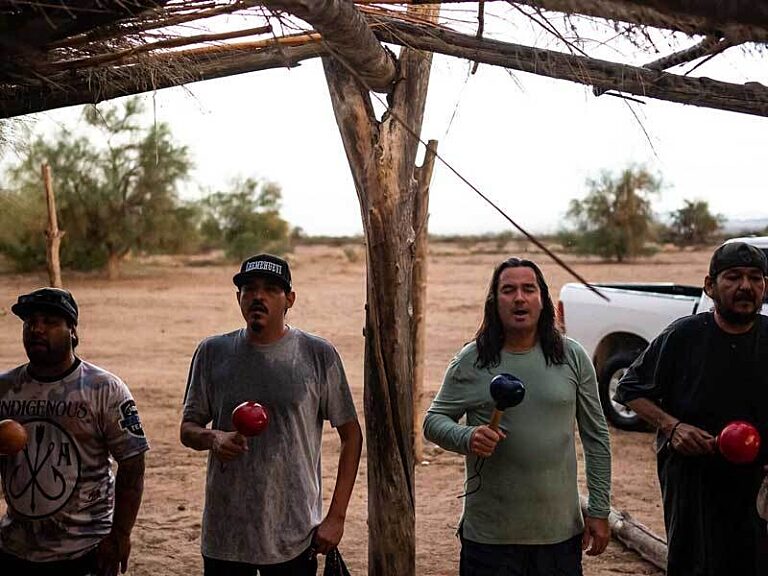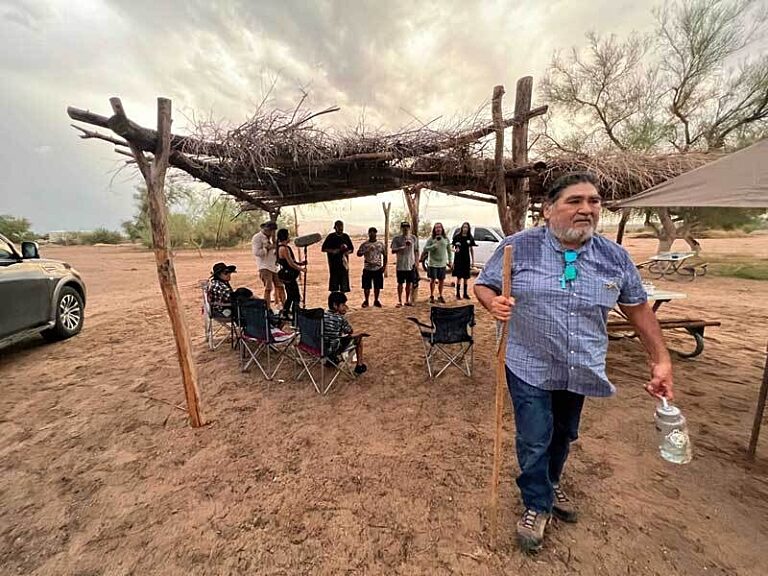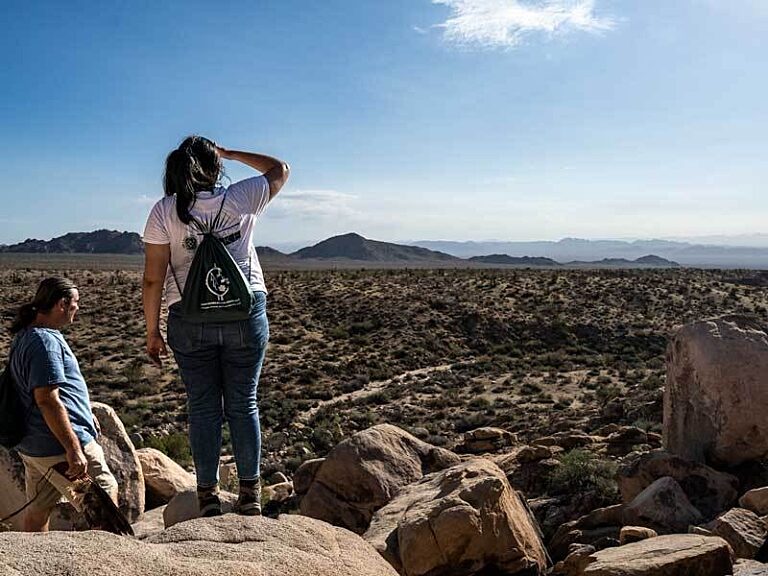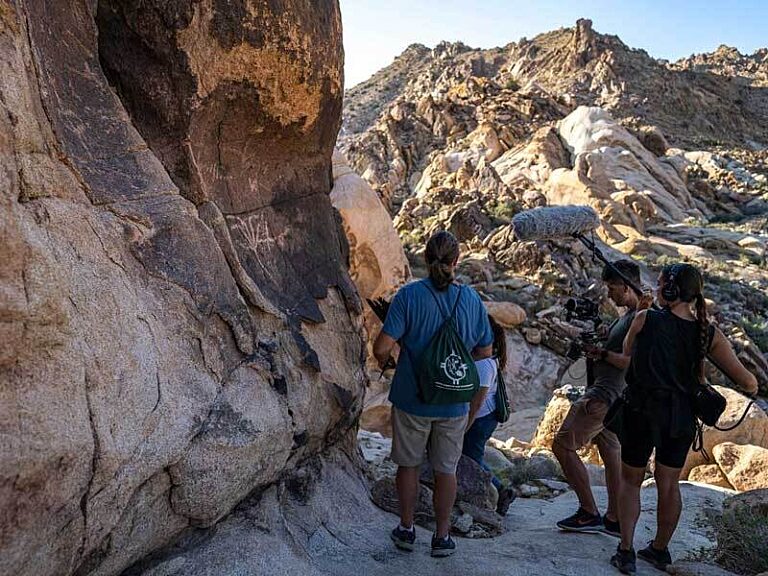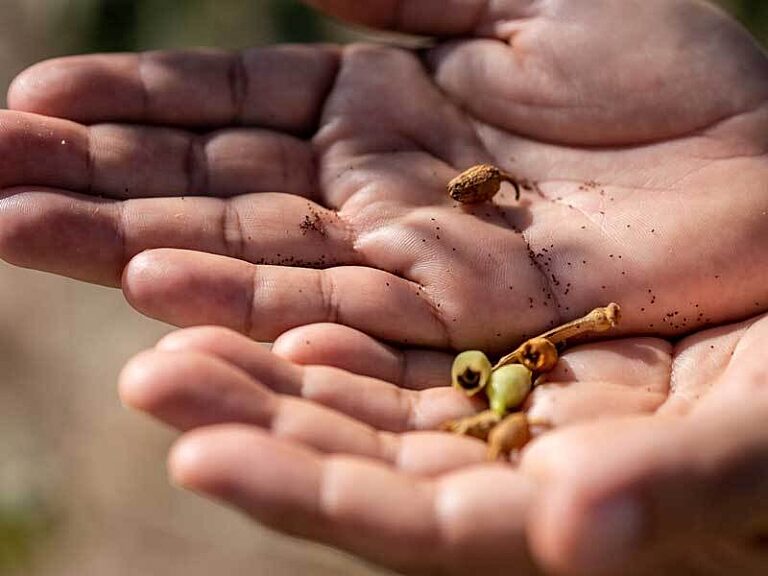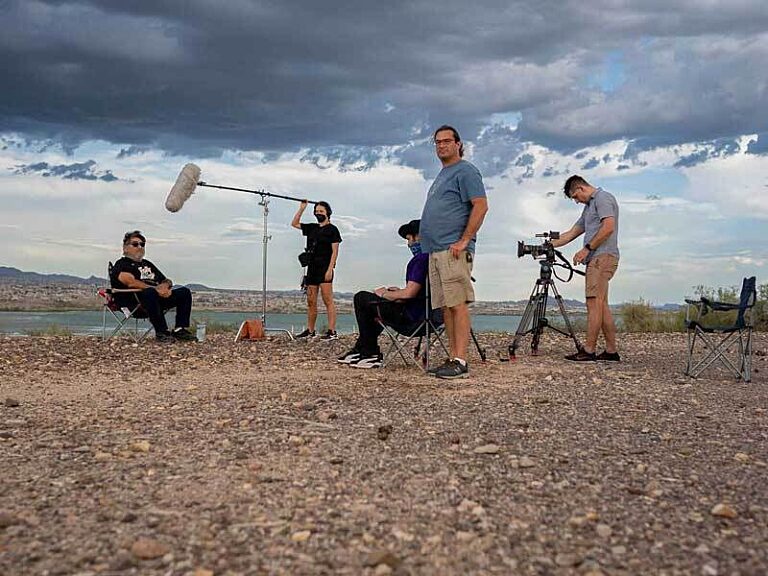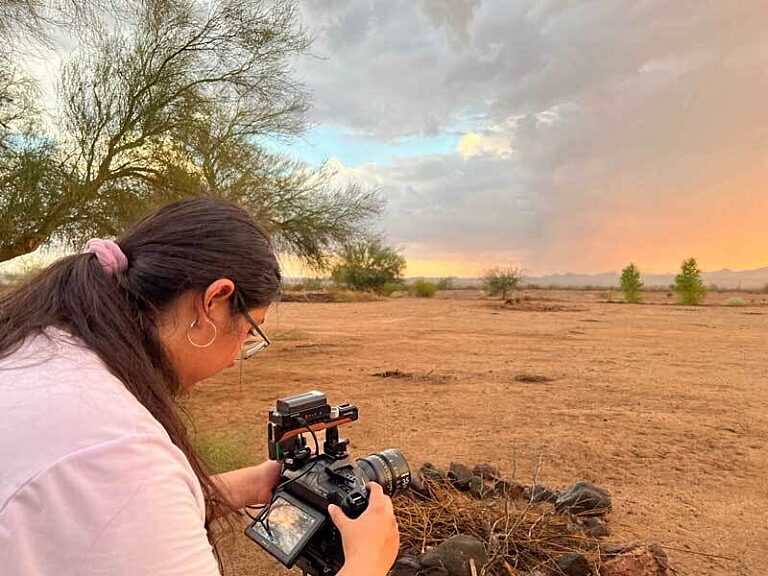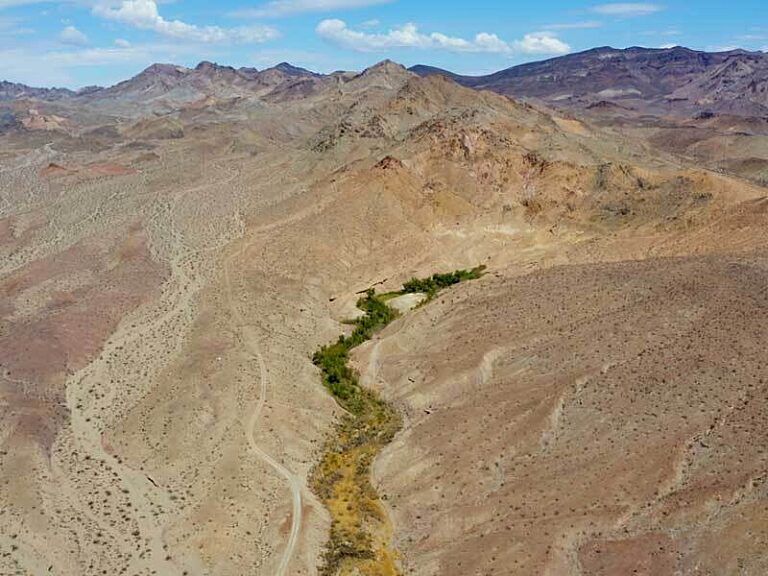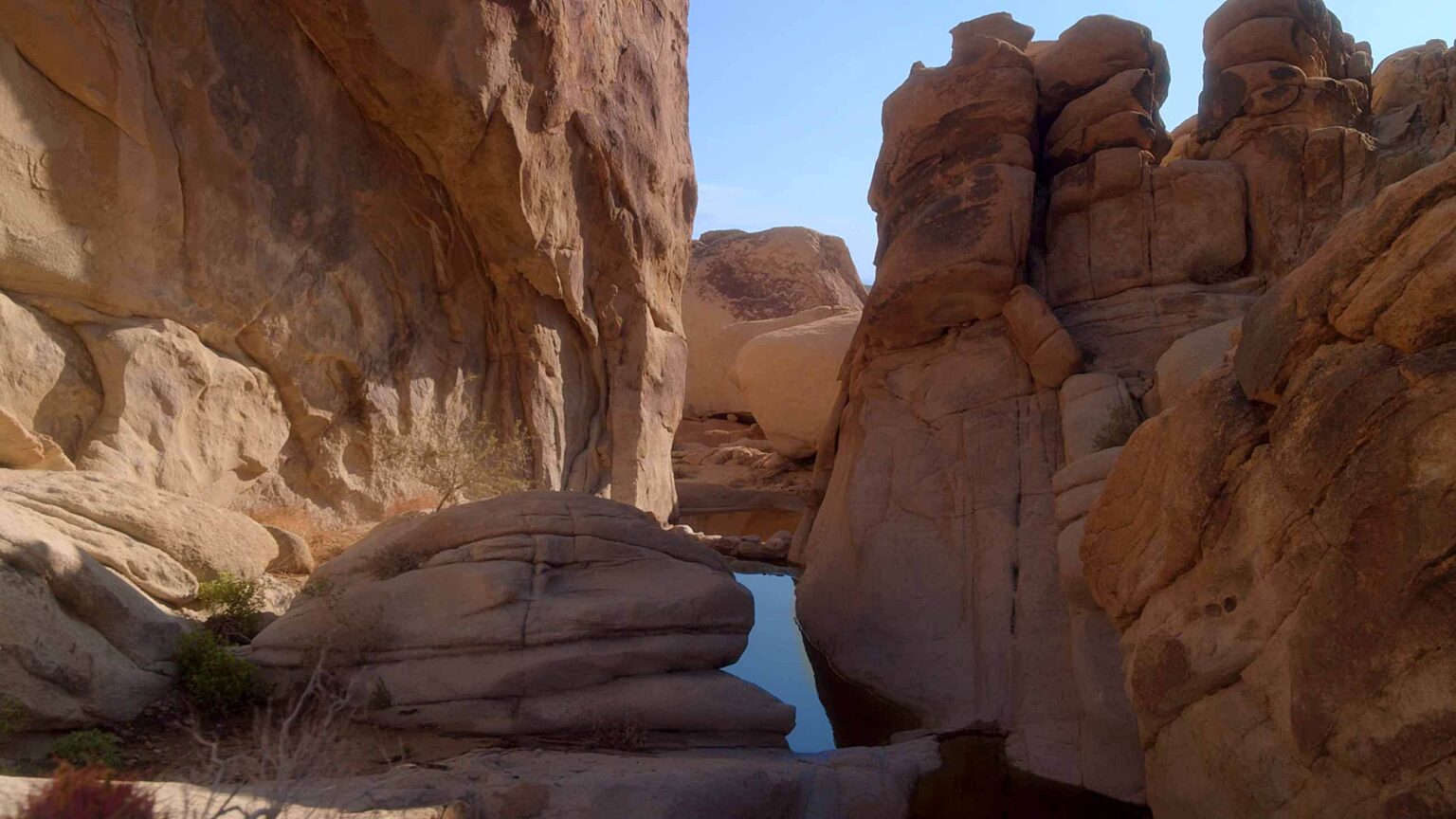Wayfinders Circle Tuhayamani'chi Pal Waniqa
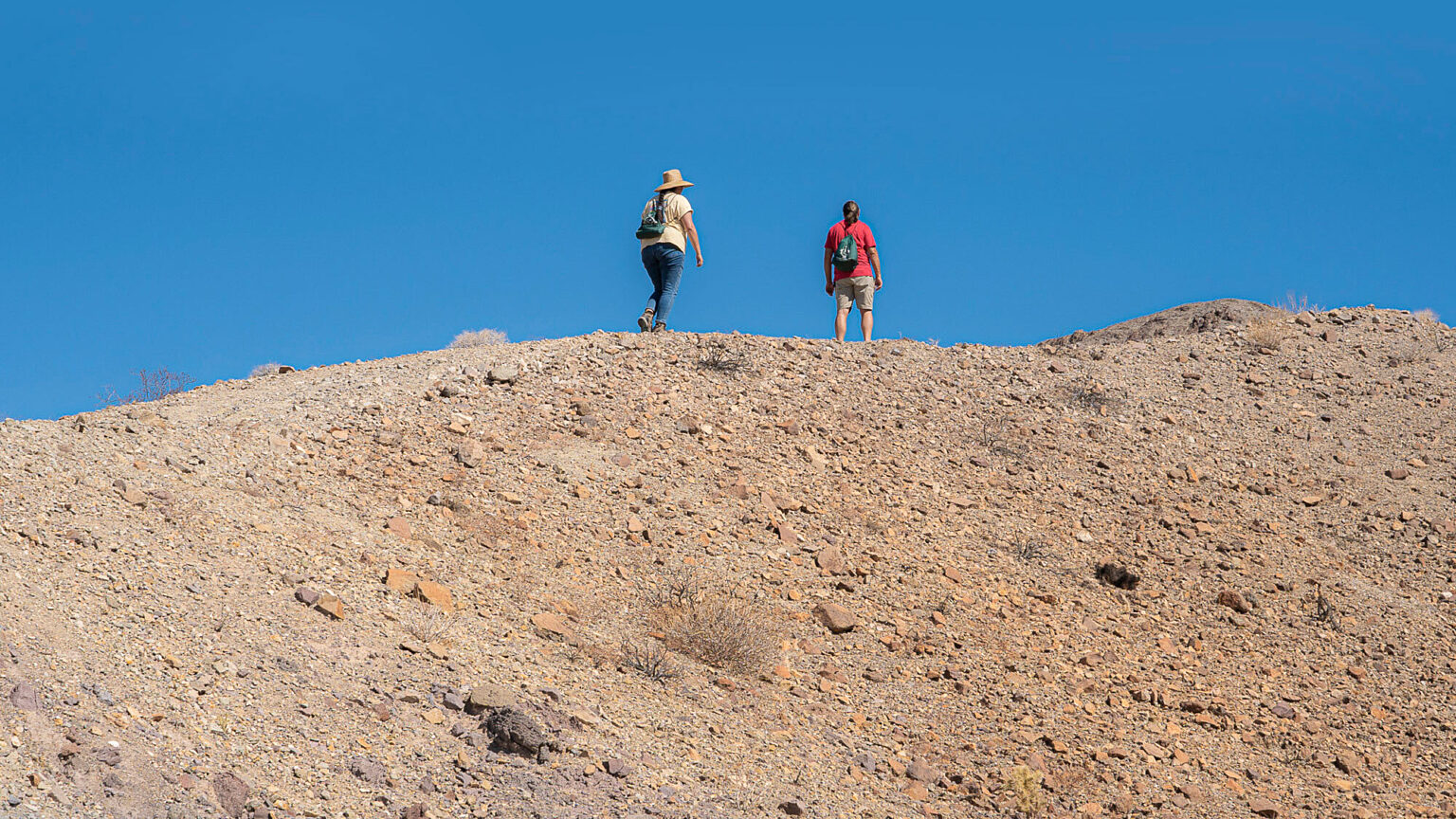
Tuhayamani'chi Pal Waniqa (The Water Flows Always)
2023 | Documentary Short | 20 MIN. 15 SEC.
Directed by Gina Milanovich (Cahuilla, Cupeño) and Nils Cowan
Tuhaymani’chi Pal Waniqa (The Water Flows Always) follows a Cahuilla, Cupeño father and daughter attempting to reconnect in a journey through their Indigenous roots in the ancient springs of the Mojave Desert, just as a new water-mining project threatens their very existence. The film addresses the efforts of protecting water resources and the sacred places of Indigenous nations, permeating the relationship between father and daughter seeking to strengthen their bonds and ancestral roots within their ancestral territory.
As a Cahuilla, Cupeño father and daughter attempt to reconnect in a journey through their Indigenous roots in the ancient springs of the Mojave Desert, Tuhaymani’chi Pal Waniqa reveals how a new water-mining project threatens the springs and the peoples of the desert very existence. The film addresses the efforts of protecting water resources and the sacred places of Indigenous nations, permeating the relationship between father and daughter seeking to strengthen their bonds and ancestral roots within their ancestral territory.
Directors’ Statement

“As a collaboration between communities and creative storytellers, this film represents months of collective effort built on many centuries of work by the Indigenous Ancestors of the region now known as Southern California. When we first learned of the illegal efforts to mine the water underneath the Mojave Desert, we were more dismayed than surprised. But those feelings soon turned to creative energy as we witnessed the galvanizing force this threat was having among Indigenous Peoples’ of the area. With both of us deeply motivated to tell stories about underrepresented viewpoints that can have a real impact on environmental issues, we quickly bonded over an approach that would weave together two storylines: An investigative look at the Cadiz water mining project; and the experiences of a father and daughter reconnecting with their traditional homelands and practices. We have been blessed many times over by the relationships and memories made while co-creating this story, and can only hope that by bringing it to the Indigenous communities of the Mojave and to international audiences, we can make a difference in protecting sacred lands and waters everywhere.
Tuhaymani’Chi Pal Waniqa is the first in an upcoming series of films created as part of the Wayfinders Circle, an Indigenous-led program of global exchange and dreaming among many of the world’s most critical land guardians.”
Gina Milanovich

Currently enrolled in the Documentary Program at San Francisco State University, Gina has been involved in filmmaking and visual storytelling since she was a High School student. Having grown up on the Agua Caliente Reservation in Palm Springs, California, she has explored stories and themes relating to the Mojave Desert ecosystem and the work of Tribal Nations in Southern California and Arizona to protect their land and water rights. She has produced several student films and independent projects about her experiences as a young Cahuilla and Cupeño woman, and has served as a volunteer at the Palm Springs International Film Festival for the past five years. Tuhaymani’Chi Pal Waniqa is her first film festival submission.
Nils Cowan

Nils Cowan is a documentary producer/writer with twenty years of experience working on award-winning original features and shorts for diverse audiences. Born and raised in Calgary, Canada, trained in the documentary industries of New York and DC, and now a leader in the thriving film scene of the Pacific Northwest, Nils’ work has focused on uplifting and amplifying underrepresented stories and perspectives. He currently lives with his wife and two kids in Issaquah, Coast Salish Territory, Washington.
Sean Milanovich, Ph.D. (Cahuilla) – NALC Vice President
Sean Milanovich is actively involved in organizing our Learning Landscapes program. He also serves on the Board of Directors for NALC partner organization, Paayish Neken, and is an enrolled member of the Agua Caliente Band of Cahuilla Indians. Sean’s journey began as a youth walking the canyons and mountains of the Mojave Desert with his father and family members, learning through direct experience the teachings of his Cahuilla and Cupeño ancestors. He took to teaching and education early on, leading trips with his own children and other tribal youth to springs and other sacred sites throughout the Mojave. He earned his MA in Public History from University of California, Riverside in 2012 and spent time leading curation efforts at both the Cahuilla Heritage Museum and the Riverside Metropolitan Museum. He earned a Ph.D. in Native American History from UC Riverside in 2021, publishing his extensive dissertation “The Treaty of Temecula: A Story of Invasion, Deceit, Stolen Land, and the Persistence of Power” about the brutal invasion of California and the ongoing effects on Indigenous Peoples and lands of the area. He lives with his wife Maria and family on the Agua Caliente Reservation in Palm Springs. Sean also represented the NALC at the first ever gathering of the Wayfinders Circle in Ecuador in October 2022.
Gina Milanovich (Cahuilla, Cupeño) – Film Student
Currently a junior earning her BA in Film and Native American Studies at the San Francisco State University, Gina spent her childhood walking the trails and swimming in the waters of the Mojave Desert with her father and extended family. She was deeply interested in writing and cameras from a young age, and realized her desire to tell stories through film while working as a volunteer at the renowned Palm Springs International Film Festival, a capacity in which she still serves today. For the film Tuhaymani’Chi Pal Waniqa, Gina led both on and off camera as a strong creative voice and a learning participant in her and her father, Sean’s journey to many of the sacred sites and relatives across the Mojave. Working on the film inspired her to pursue a second major along with her BA in Film Studies and work towards her degree in Native American Studies as well. Excited about graduating and continuing to tell her people’s stories, Gina is developing a documentary project on the famous all-Female Tribal Council of Agua Caliente of the 1950s and 1960s, which made huge strides forward in terms of land rights and sacred site protections for the Cahuilla and other tribes of present-day Southern California.
Michael Madrigal (Cahuilla) – NALC President
Michael Madrigal is a founding member of the NALC and has served on the Board of Directors for a number of years. Currently NALC Board President, Michael helps to lead the organization overall and set goals and initiatives within the organization. Michael is an enrolled member of the Cahuilla Band of Mission Indians and currently lives and works from the Soboba Indian Reservation where he grew up. A BA and MA degree holder in Ethnic/Native American Studies and a noted Ivillu’at language learner and teacher, Michael is dedicated to strengthening Indigenous Peoples’ relationships with language and homelands.
T. Robert Przeklasa, Ph.D. – NALC Executive Director
Robert “Dr. Bob” Przeklasa served on the Board of Directors of the NALC for six years before becoming the executive director in June 2021. Previously, he served as executive vice president of California Indian Nations College and has many years of experience with tribal and environmental issues. After receiving his BA and MA and Teaching Credential at Cal State Fullerton, Robert earned a Ph. D. in Philosophy from University of California, Riverside, where he took particular interest in the Mission Indian Federation, a Tribal Rights organization formed in Southern California in 1919 that advocated for decades for the rights and land of the original people of Southwest. A highly experienced outdoor educator and dedicated fundraiser and tribal advocate, ‘Dr. Bob’ is at home in both the board room and deep in the desert that he has spent much of his life working to preserve.
Matthew Leivas, Sr. (Chemehuevi) – Former NALC President
A highly respected Chemehuevi elder, Tribal scholar, environmental activist and Salt Song singer, “Matt” Leivas has worked his entire adult life to preserve the history and sacred sites of the Mojave Desert. In 1938, his mother, Gertrude Hanks, was among several thousand Chemehuevi who were forced to flee their fertile homeland in the Colorado River Basin when the Parker Dam was constructed in order to transport water to rapidly growing coastal California cities. Born in Parker, AZ on the Colorado River Indian Tribes Reservation (CRIT), Matt is the youngest of two brothers, five sisters and several older half-siblings. At an early age he worked with Tribal elders to help reestablish the Chemehuevi homeland along the shores of Lake Havasu. Today, the Chemehuevi Indian Reservation spans almost 30,000 acres and has a burgeoning farm and vibrant cultural programs which were initiated in large part by Matt. He continues to reside and work from his home on Chemehuevi lands, helping to raise his grandchildren and keeping his People’s culture and attachment to the land and water as strong as possible.
Daniel Leivas (Chemehuevi) – Tribal Farm Manager
As Farm Manager for the Chemehuevi Tribe, Daniel Leivas oversees the sustainable planting and harvest of organic fruit – from melons to pomegranates – ceremonial gourds, and diverse species of shade trees that provide spaces for solitude and gathering for the community. He also manages the Chemehuevi’s agricultural water intake program, which consistently draws well below the Tribe’s government-allotted annual limit from Lake Havasu, which was created in 1938 when the completion of the Parker Dam flooded the Colorado River valley. Daniel lives with his family on the Chemehuevi Farm, not far from his father, Matthew Leivas, Sr. A respected Salt Song Keeper, he and his family have been active in preserving sacred places and fighting extractive industrial projects throughout the Mojave.
Tokyo International Short Film Festival
Date: October 2024
Location: Tokyo, Japan
Nelson Arts Festival
Date: October 2024
Location: Nelson, New Zealand
Sioux City International Film Festival
Date: October 2024
Location: Sioux City, Iowa
Sidewalk Film Festival
Date: August 2024
Location: Birmingham, Alabama
Flagstaff International Film Festival
Date: August 2024
Location: Flagstaff, Arizona
Whistleblower Summit & Film Festival
Date: July 2024
Location: Washington, DC
Florida Environmental Film Festival
Date: May 2024
Location: Sarasota, Florida
Festival de Cine y Multimedia
Date: April 2024
Location: Buenos Aires, Argentina
Capital City Film Festival
Date: April 2024
Location: Lansing, Michigan
Riverside International Film Festival
Date: April 2024
Location: Riverside, CA
International Wildlife Film Festival
Date: April 2024
Location: Missoula, Montana
North Dakota Human Rights Film Festival and Summit
Date & Time: November 8, 2023 at 7:00 PM CST
Location: Fargo Theater, Fargo, North Dakota
Hibulb Cultural Center Film Festival
Date: November 16th, 2024
Location: Tulalip, Washington
Nature Track Film Festival
Date: October 2023
Location: Goleta, California
NatiVisions Film Festival
Date: September 2023
Location: Parker, Arizona
Local Sightings Film Festival
Date: May 2023
Location: Seattle, Washington
Seattle International Film Festival
Date: May 2023
Location: Seattle, Washington
Here you can download the press notes, containing comprehensive information and insights into the making of the film, the people involved, images, contact and other information for press.
The Native American Land Conservancy (NALC) was founded in 1998 as a nonprofit organization comprised of Native American and non-Native people who are dedicated to stewarding, preserving, and protecting sacred lands. Our first acquisition was our preserve in the Old Woman Mountains about forty miles west of Lake Havasu. Since then, we have played major roles in the preservation of other culturally significant places in Southern California. The NALC was fundamental to the formation of the Kumeyaay-Diegueno Land Conservancy in 2013 and the Native Land Trust Council in 2017. We became caretakers of our newest preserve, Coyote Hole, in 2018, and today are increasingly active in efforts to conserve the land and waters of our desert region.
This journey started out while attending a cultural strengthening group that was being held on the Twenty-Nine Palms Indian Reservation in the late 1990s. It was a place for tribal elders, primarily culture bearers from the Cahuilla, Chemehuevi, and Southern Paiute nations, to share tribal traditions with younger community members. Members of the Twenty-Nine Palms Band of Mission Indians, most notably Dean and Theresa Mike, provided the space and most of the resources required for our work to begin. It was from this group that the core group of founding members of the NALC emerged. The earliest motivation for our work came out of the recognition that our tribal cultures can only remain vibrant for the coming generations if we are able to revitalize the life-sustaining relationships that we have with the land. For Native peoples, this relationship is rooted in countless generations having lived in this part of Southern California with the understanding that the Earth is a living being that provides to us what is needed for life. This is why we so deeply respect the Earth and take care to protect the land, air, and water for ourselves and future generations. In doing this work, we honor our ancestors and future generations while caring for all of our relations with whom we share this home.
Over the last 500 years, Native American tribes have lost the vast majority of their traditional homelands to colonization. On these lands sat homes, farms, hunting areas, and sacred sites. The loss of these sacred places and even access to them was a particularly hurtful wound, though many sacred sites and landscapes still exist outside reservation lands. Since 1998, the Native American Land Conservancy (NALC) has worked to preserve and protect our sacred lands. We do this through acquisition, advocacy, education, management, and restoration. The threats to these sites and land grow every day, from unchecked development and extraction to climate change and species extinction.
Support the NALC and help us save our sacred lands. Donate Today!
We would love to hear from you! Please fill out the form below to get in touch regarding any film-related inquiries, feedback, or collaboration opportunities.
Note: This film is not available for screenings at this time. For other films of these series, please fill out the form below.
Acclaim For The Film






Behind the Scenes
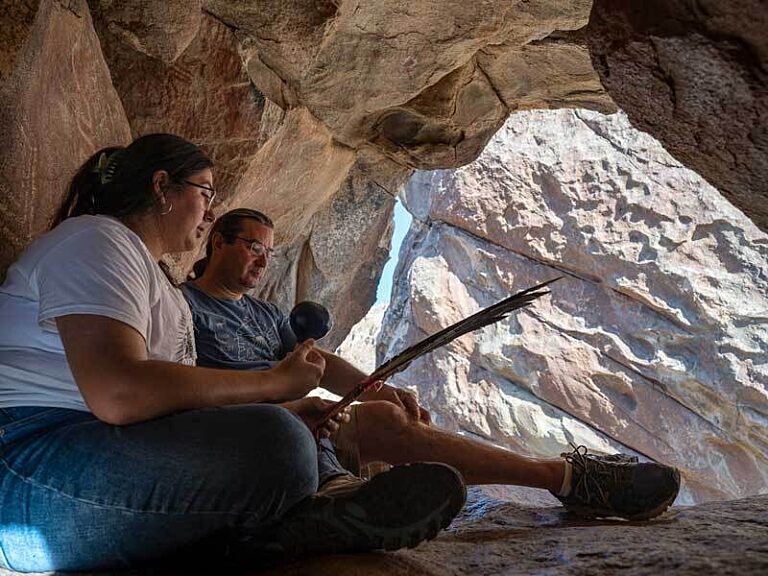
Inside Sacred Cave at Old Woman Mountains
